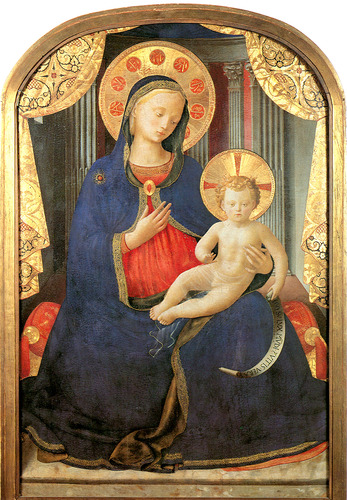
The Life of the Blessed Virgin Mary by Blessed Anne Catherine Emmerich
4. JOSEPH TAKES THE BABY JESUS FROM MARY BECAUSE OF DANGER.
[December 27 ^th:] The Blessed Virgin told her mother all about the three kings, and they looked at all the things that the latter had yesterday left behind in Maraha's grave. I saw two shepherds come and warn the Blessed Virgin that people were coming from the authorities to look for her Child. Mary was in great distress at this, and soon after I saw St. Joseph come in and take the Infant Jesus from her arms. He wrapped Him in a cloak and took Him away; I can no longer remember where to. I now saw the Blessed Virgin for at least half a day alone in the cave without the Infant Jesus and full of a mother's fear and anxiety. When the time came near for her to be called to give suck to the Child, she did as all good mothers are wont to do after being alarmed or upset: before suckling the Child she pressed out from her breast the disturbed milk, letting it fall into a little hollow in the white stone bench in the cave. This she told to a good devout shepherd who came to her (probably to lead her to the Child). He, deeply sensible of the holiness of the Mother of the Redeemer, afterwards scooped carefully out with a sort of spoon the virgin milk enclosed in the little white hollow of the stone. In his simple faith he brought it to his wife, who was suckling a child but had not enough milk to feed it. The good woman drank this holy nourishment with reverent trustfulness, and at once her faith was rewarded, so that she was able to feed her child abundantly. Since then the white stone in this cave was given a similar healing power, and I saw that right up to our own day even Mohammedans, though unbelievers, use it as a remedy in this as in other bodily ailments. The earth from this place was for ages cleansed and pressed into small moulds by the guardians of the Holy Land and distributed throughout Christendom as a pious remembrance. These relics bear the inscription de lacte sanctissimae Virginis Mariae' (of the milk of the Most Holy Virgin Mary').
CONTENTS | NEXT | FOOTNOTESCopyright ©1999-2023 Wildfire Fellowship, Inc all rights reserved

 Keep Site Running
Keep Site Running